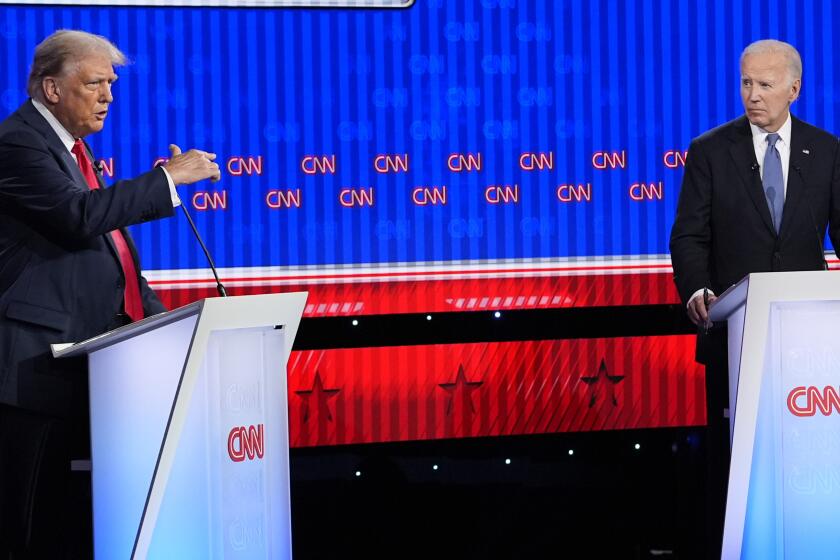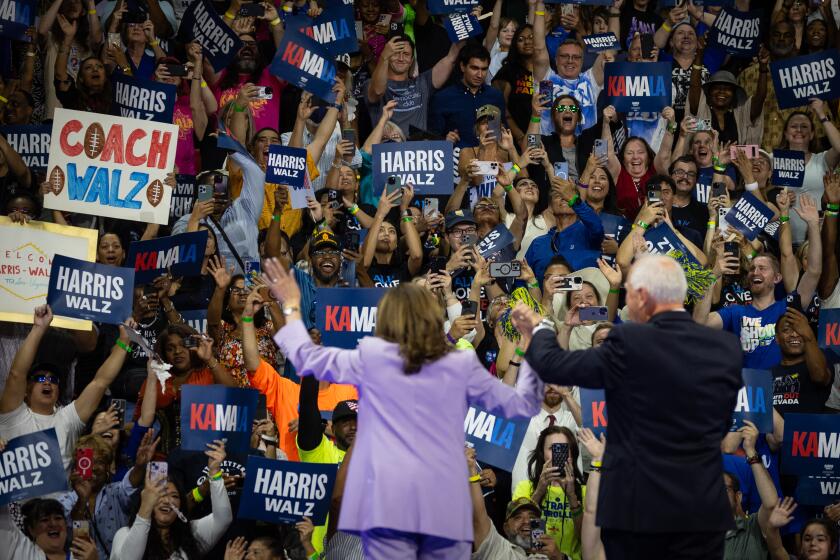After thrashing, President Obama plans a ‘substantive’ bipartisan meeting
Two days after voters soundly chastised his party, President Obama on Thursday invited Republican and Democratic congressional leaders to the White House in the hopes, he said, of getting all sides to work together on the nation’s problems.
In televised remarks with his Cabinet looking on, Obama told reporters that the meeting was needed after voters sent a message on Tuesday. Republicans won control of the House of Representatives and broadened their influence by adding six seats in the Senate.
“I want us to talk substantively about how we can move the American people’s agenda forward,” Obama said. “It’s not just going to be a photo op.”
At a later briefing, spokesman Robert Gibbs said the president would invite eight Republican and Democratic leaders to a meeting and dinner at the White House this month, the first of many such sessions. Gibbs again signaled that the president was open to discussing the details of an extension of the Bush-era tax cuts set to expire at the end of the year.
Among those at the leaders meeting will be Rep. John Boehner of Ohio, set to become the new speaker when the Republicans take over the chamber in January, and Senate Minority Leader Mitch McConnell of Kentucky. Also invited are top Democrats including Majority Leader Harry Reid, who won reelection from Nevada, and Rep. Nancy Pelosi, the current speaker, who will relinquish the gavel.
On Wednesday, Obama offered to work with Republicans on finding common ground after an election that Obama candidly described as a shellacking. Both Republican leaders said they were willing to work on solving problems but were adamant about maintaining the agenda on which they so successfully ran.
That platform includes a repeal of the healthcare insurance overhaul, a centerpiece of Obama’s two years in office, as well as actions to cut the deficit and taxes.
Obama has noted that politics and philosophical differences will continue to exist after the election, especially with the 2012 presidential campaign already having begun. But the president called on all parties to work together for the common good.
For his part, McConnell on Thursday was not in a compromising mood. In remarks at the Heritage Foundation, the minority leader was insistent that his party had a mandate for change.
“Over the past week, some have said it was indelicate of me to suggest that our top political priority over the next two years should be to deny President Obama a second term in office. But the fact is, if our primary legislative goals are to repeal and replace the health spending bill; to end the bailouts; cut spending; and shrink the size and scope of government, the only way to do all these things it is to put someone in the White House who won’t veto any of these things,” he said in televised remarks.
“We can hope the president will start listening to the electorate after Tuesday’s election. But we can’t plan on it. And it would be foolish to expect that Republicans will be able to completely reverse the damage Democrats have done as long as a Democrat holds the veto pen,” he said.
“On healthcare, that means we can — and should — propose and vote on straight repeal, repeatedly. But we can’t expect the president to sign it. So we’ll also have to work, in the House, on denying funds for implementation and, in the Senate, on votes against its most egregious provisions. At the same time, we’ll need to continue educating the public about the ill effects of this bill on individuals young and old, families and small businesses.
Obama is scheduled to leave Friday for a trip to Asia, and Congress is expected to return around Nov. 15 for a lame-duck session. Extending the tax cuts will be the key item on the legislative calendar.
Republicans want to extend the cuts across the board, but Obama and Democrats have argued the cuts should only be extended for the middle class. During the campaign, Obama argued the country could not afford to extend the cuts for those families earning more than $250,000 a year.
michael.muskal@latimes.com
twitter.com/LATimesmuskal
peter.nicholas@latimes.com
More to Read
Get the L.A. Times Politics newsletter
Deeply reported insights into legislation, politics and policy from Sacramento, Washington and beyond. In your inbox three times per week.
You may occasionally receive promotional content from the Los Angeles Times.











